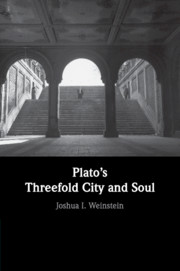Book contents
- Plato's Threefold City and Soul
- Plato's Threefold City and Soul
- Copyright page
- Contents
- Acknowledgments
- Introduction
- Part I Injustice As Opposition of Characters
- Part II Justice As Function in City and Soul
- Part III Thumos and Control through Time
- Conclusion
- Bibliography
- General Index
- Index Locorum
- References
Bibliography
Published online by Cambridge University Press: 19 October 2018
- Plato's Threefold City and Soul
- Plato's Threefold City and Soul
- Copyright page
- Contents
- Acknowledgments
- Introduction
- Part I Injustice As Opposition of Characters
- Part II Justice As Function in City and Soul
- Part III Thumos and Control through Time
- Conclusion
- Bibliography
- General Index
- Index Locorum
- References
- Type
- Chapter
- Information
- Plato's Threefold City and Soul , pp. 274 - 282Publisher: Cambridge University PressPrint publication year: 2018



